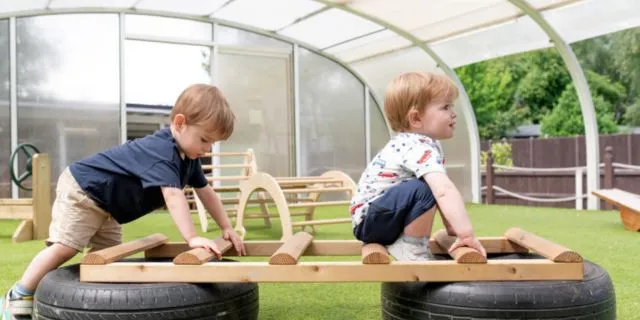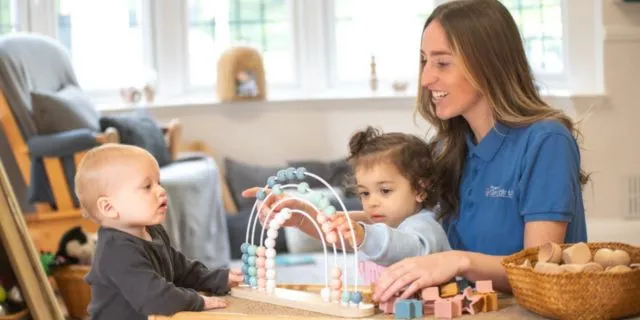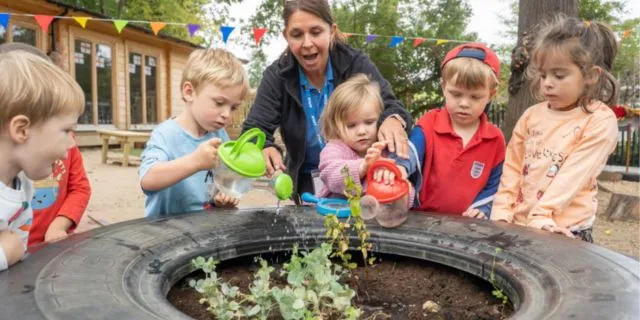Careers
Men in Childcare: Why we need more men in the Early Years Sector
Careers

Following on from our Grandir UK’s Men in our Business blog to celebrate International Men’s Day, we wanted to do a deeper dive into men working in the Early Years industry.
To begin, we needed to understand why there are so few men working in such a vital profession.
The most recent figures show that only 2% of childcare workers are men. Even now, Early Years education is stereotypically viewed as a profession almost exclusively for women.
We know that men excel in caring professions, for example, there are significant number of men now working in nursing and elderly care, so why is childcare not seeing the same gender equity?
This blog takes a look through the microscope to explore why such a small percentage of early years professionals are male, identify the key barriers to recruiting men into early childhood education and discuss what we can do to encourage more men to consider childcare as an exciting and fulfilling career option.

How many men work in Early Years Education?
The Department of Education’s Childcare & Early Years Providers Survey 2023 shows that only 2% of people working in the Early Years sector in England are male, and evidence suggests that this is not just a UK issue but is likely a worldwide challenge. According to the OECD’s Good Practice for Good Jobs in Early Childhood Education and Care: Eight policy measures from OECD countries report in 2019, on average 3% of pre-primary teachers are men across their countries.
We know that in the past childcare has typically been perceived as a ‘women’s job’ and as a society, we largely still see early years care as an overwhelmingly ‘feminine’ profession. However, this is not the case for other roles in care and education traditionally or previously seen as ‘feminine’. Figures from the Department of Education’s School workforce in England 2023/24 Report shows that men make up 24% of the total number of primary and secondary school teachers; and the Nursing & Midwifery Council’s NMC Register UK Mid-year Update for 2024 shows that 11.1% of registered nurses in the UK are male. So why is it taking Early Years settings so long to catch up?
What are some of the barriers that men face in the Early Years sector?
The reason for the big gender divide in the Early Years workforce is likely to stem from the stigma associated with men entering typically female workspaces and gender stereotypes attached to caring for children.
We’ve talked to a number of men in our industry on this topic, and a few key themes come up again and again, they include:
1. The childcare profession can be isolating for men
Working in a predominantly female environment can make men feel out of place in the workforce. In a Frobel Trust article, Pete Moorhouse, a travelling tutor and an advocate for creativity in early education, noted that it can ‘feel awkward and isolating being the solitary male in a team’ and ‘the only man in the staff room at lunch time.’
Hiring more men in nurseries and preschools would naturally balance out the ratio of women to men, making men feel more comfortable in the workplace. This highlights a strong case for childcare providers to actively recruit more men in childcare to ensure their workforce is more inclusive, equitable and balanced.
2. Women are naturally more ‘gifted’ at caring for children – gender stereotypes
This belief is still common even now amongst women as well as men. However, there has been plenty of research to show that men are just as capable of caring effectively for children as women are.
3. Men avoid careers with limited career progression
There is a huge misconception that childcare roles and opportunities do not go beyond the nursery practitioner level. Most day nursery and preschool settings will focus on showcasing the great day-to-day care they provide, highlighting that they nurture young children to reach their full potential, and rightfully so.
However, behind the scenes, the opportunities for career progression in childcare are vast! An Early Years career can extend to a managerial level, even overseeing multiple nurseries in large childcare organisations. Professionals can also specialise in certain areas such as Forest Schools, Montessori, SENCo and more. A career in childcare can open pathways to roles in Early Years Specialist teams, creating bespoke curriculums for a wide network of nurseries, just like we have at Grandir UK.
Once broken down, the main barriers men face in pursuing a career in childcare are not really barriers, but perceptual challenges to be tackled and overcome. We know, from working with our incredible male colleagues at every level of our business that men can offer exceptional care and bring a valuable approach to teaching and caring for children in their early years, and it is crucial to recruit more men into this rewarding profession to enable us to deliver that balanced, equitable early years environment and education that children so benefit from.

What are the benefits of having more men in childcare?
At Grandir UK, we recognise the many benefits of having more male educators in the Early Years industry.
Firstly, having more men in childcare means introducing more positive male role models to the children in their care, giving those children a more balanced, broad and equitable early years education. It also shows children a more balanced range of different male and female roles and relationships outside of their own family unit. A positive, caring and significant male figure can also connect with children in a different way, forming different types of bonds and relationships and as a result children in their care receive the very best early years care with a positive blend of everything that both male and female care givers can offer.
Overall, having men in the early years’ workforce creates a more accurate reflection of gender diversity in the real world – in schools, their local communities, the workplace and the wider world! A more balanced practitioner profile supports children in learning how to form bonds with and relate to both men and women outside of their family and social circles. A mix of genders is a normal part of day-to-day life, and nurseries and preschools should be no different, reflecting gender equity and offering balanced, expert caregiving to children at every stage.
What are we doing to bridge the gender gap in Early Years?
At Grandir UK, we aim to be as diverse as we can be, hiring a wide range of talent regardless of their gender or any other characteristic. In our latest Great Places to Work survey, 94% of our workforce felt that they were treated fairly regardless of their gender. We have a diverse and inclusive recruitment process and proud to have men working across our business at all levels – from nurseries all across England to our support office. We pride ourselves in supporting male colleagues with their career progression and aspirations, and we currently have 10 male apprentices training with us at Grandir UK!
Read our latest blog about the male staff that work within our business, from the nursery apprentices to nursery managers, and hear their stories of how they got into childcare and working for Grandir UK.

We are advocates for career opportunities for all genders!
We are committed to supporting everyone’s career in childcare from our apprenticeships to leadership roles in Early Years education. Grandir UK can help you grow to reach your full potential. Find out more about our professional development opportunities, apprenticeships, or find a role in a nursery near you! Let’s grow together.
Share this article
Related blog/news
Swipe to see our latest articles.









